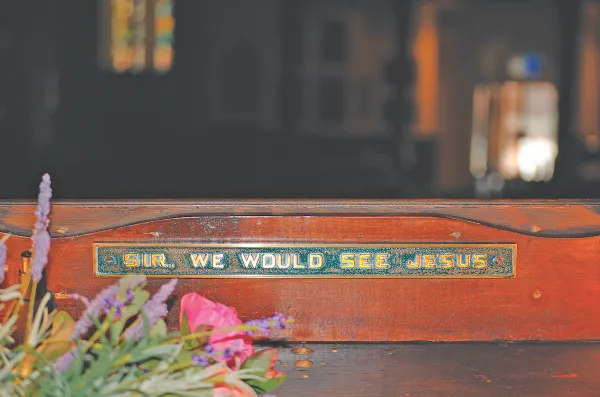How should we then engage? [2/3]
![How should we then engage? [2/3]](/content/images/size/w1200/2025/06/ChatGPT-Image-Jun-25--2025--09_13_47-PM.png)
Part 2: Echoes of Nebuchadnezzar
In Part 1 of the mini-series, "How should we then engage?", I suggested the need for Christians to bring a spirit of critical love and loving criticism into the chaos of political discourse. That plea isn't theoretical. It’s deeply personal – and pastoral.
And I've promised to try to model that very thing, and will attempt now to do so here, as I expound a biblical concern I've had for years, which I simply can’t ignore:
When I listen to President Trump – particularly in his unscripted moments – I hear the echoes of Nebuchadnezzar.
The moment one of my former mentors made this observation, it instantly resonated, and I haven't been able to shake it since.
Not because I want to demonize the man – but because I believe the Church needs to wake up to something spiritual at stake. We’ve seen this dynamic before in Scripture. And I believe we may be seeing it again.
Nebuchadnezzar, in Daniel chapter 4, was the most powerful man in the world. He ruled over a vast empire with unmatched wealth and military strength. One day, he stood on the roof of his palace and looked out over Babylon. With swelling pride, he declared:
"Is not this the great Babylon, which I have built by my mighty power as a royal residence and for the glory of my majesty?" (Daniel 4:30)
It was a moment of breathtaking arrogance – and it cost him everything.
God severely humbled Nebuchadnezzar, driving him into madness until he would acknowledge that "the Most High rules the kingdom of men and gives it to whom he will." (v. 32)
And when I hear President Trump, I can’t help but hear similar echoes:
"I know more about ISIS than the generals."
"Nobody knows more about taxes than me, maybe in the history of the world."
"Nobody's ever been more successful than me."
"Nobody has ever done so much in the first two years of a presidency as this administration. Nobody. Nobody."
“This horrific disaster would never have happened if our election was not rigged and if I was the president.”
“If I were president, this war would never have started. I would have stopped it immediately. In 24 hours.”
"They gave it to Obama. He didn’t even know what he got it for. He was there for about 15 seconds, and he got the Nobel Peace Prize. He said, ‘Oh, what did I do?’ With me, I made a deal, I saved a country, and I just heard that the head of the Nobel Peace Prize is looking to give it to me… I should get the Nobel peace prize, but they'll never give it to me..."
We could go on ad nauseam. Sadly, the media has bombarded us with so many of these (very real) quotes, and our president continues to supply them, now most of us can hear them in Trump’s own voice as we read.
"Oh Bill - C'mon — that's just the way he talks."
My friends, these are not just bold campaign slogans. And these words are more than internet trolling. They reveal a heart fixated on its own greatness. And worse – a greatness self-perceived as self-made, self-powered, and self-glorifying.
Just like Nebuchadnezzar, I believe that the temptation for our president comes not merely in wielding power—but in believing that power originates from within. Or at least that the right to it originates from his own greatness.
Nebuchadnezzar was not judged for building a great nation, but for boasting as though it were his own doing. His sin was not ambition, but arrogance. And it was only when he lifted his eyes to heaven and acknowledged that the Most High rules the kingdom of men (Dan. 4:34–35) that his sanity returned.
Now there's a warning there for our president – but also for us; we the people.
When the condition of our hope depends on rulers who exalt themselves – whether to praise those rulers, or to condemn them – we lose sight of the real King of Kings. And if our current leader were to be humbled by God as Nebuchadnezzar was... we probably shouldn’t assume our nation would emerge unshaken.
In our present climate, we’ve placed so much emotional, political, and even spiritual weight on Donald Trump that if God were to humble him in any kind of similar way – publicly, unmistakably, and painfully – it’s hard to imagine America holding together with any semblance of peace.
That’s not a reason to fear God's work of humility. It’s a reason to examine ourselves.
What does it say about the condition of our country – or the Church – if our stability is so fragile, our emotions so reactive, and our loyalties so skewed that one man’s undoing would spark chaos?
There's Always Hope
To be clear – if we keep reading Daniel, we find that Nebuchadnezzar’s story didn’t end in humiliation. It ended in worship. When he finally lifted his eyes to heaven, the king of Babylon declared that God’s dominion is everlasting and His kingdom endures from generation to generation.
So, what if we prayed – not just for President Trump’s protection – but for his perspective? When Paul exhorts us to pray for kings (I know, I know – "no kings") and for all those in authority, the reason he gives is this: ... for God desires all people to be saved and to come to the knowledge of the truth (1 Tim. 2:1–4).
Let us then pray – not that God would remove Trump, or that God would remove Trump’s enemies – but that Mr. Trump himself, like Nebuchadnezzar, might look to heaven, come to the knowledge of the truth, and say with clarity and conviction: "Those who walk in pride He is able to humble." (Daniel 4:37).
But prayer alone is not the only response needed.
If we truly believe that God rules the kingdom of men – and that Christ alone is King – then we must also reflect that truth in how we engage with our political moment. Humility is not just something we ask God to form in our leaders; it’s something we must embody ourselves.
And yet, in today’s climate, many Christians feel stuck. Some are tempted to throw their entire weight behind (or against) political personalities. Others feel disgusted and opt out of the conversation entirely.
But complete disengagement isn’t any more of an answer than blind devotion.
In Part 3, we’ll explore what it means for Christians – including pastors and leaders – to engage the political world with conviction and clarity, without being consumed by it. Not with rage. Not with retreat. But with a faith-shaped courage that remembers who really sits on the throne...



